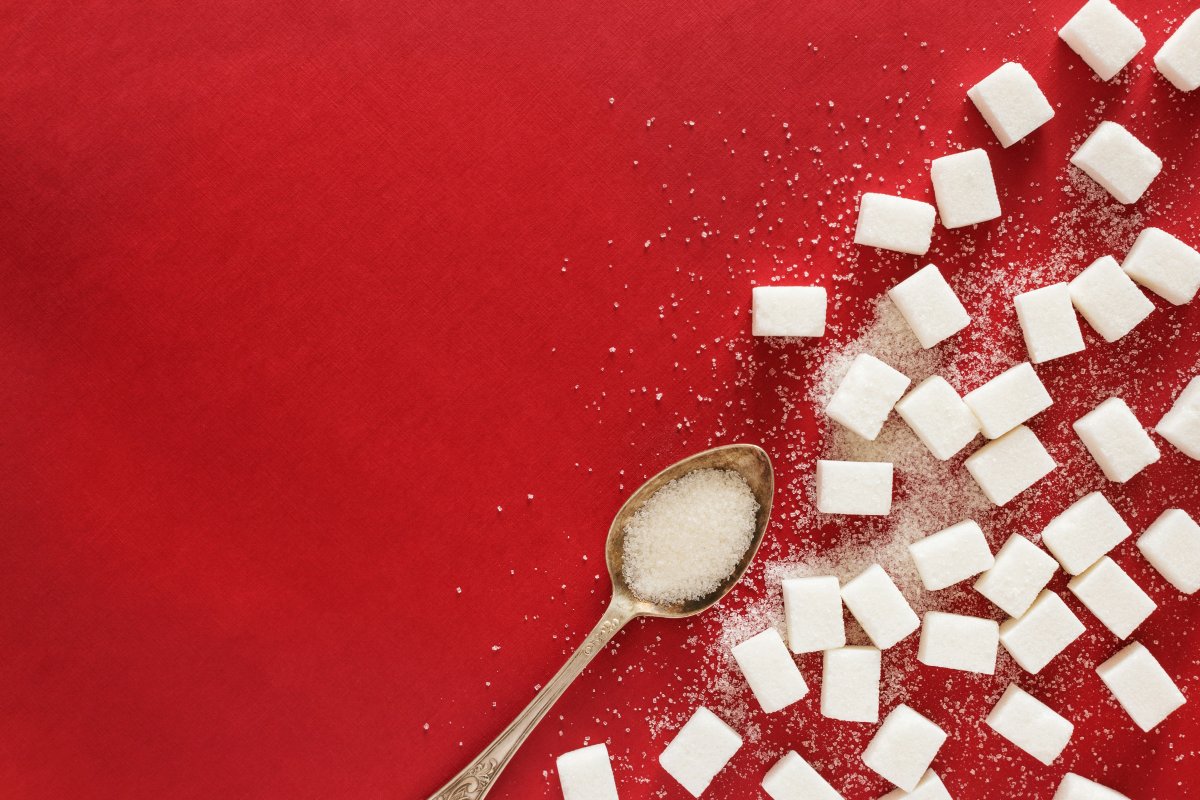
While you've been diligently checking sodium labels and reaching for the low-salt options, there's another culprit quietly driving up your blood pressure—and it's hiding in foods you'd never suspect.
Around 1 in 4 adults living in Australia have high blood pressure (23 per cent), making it one of our most pressing health challenges. Yet three in four (74.5 per cent) adults with high measured blood pressure did not report having hypertension, meaning most people don't even know they have it.
The latest research is pointing the finger not at salt, but at added sugars—particularly those lurking in ultra-processed foods that make up nearly half of what we eat.
In this article
When sweet becomes dangerous
We've long known that too much salt can push up blood pressure, but Australian women who reported higher intakes of ultra-processed foods were found to be 39 percent more likely to have high blood pressure in a 2024 study. What's particularly concerning is that this association remained even when adjustments were made for fibre, energy, fat and carbohydrate content of the foods, suggesting that it is not purely the higher levels of refined sugars and fats in ultra-processed foods that lead to poor health outcomes.
'Ultra-processed foods comprise a whopping 42 per cent of the Australian diet'
The problem isn't just the amount of sugar—it's how these foods are engineered. Ultra-processed food products contain 4.7 times more free sugars, 2.9 times more sodium, and 1.9 times more energy density than non-ultra-processed products, while providing significantly less nutrition.
The Australian ultra-processed reality
Ultra-processed foods comprise a whopping 42 per cent of the Australian diet, according to recent research from Deakin University. These aren't just obvious culprits like soft drinks and lollies—they include many foods that seem healthy or convenient.
What are ultra-processed foods?
Ultra-processed foods are industrial formulations with many ingredients you wouldn't find in a home kitchen. Look out for: emulsifiers, artificial colours, flavour enhancers, preservatives, modified starches, and protein isolates. Common examples include soft drinks, packaged snacks, instant noodles, mass-produced bread, processed meats, and many breakfast cereals.
The way these foods are manufactured appears to override our natural satiety signals. Processing techniques such as the partial or total withdrawal of water, the deconstruction of the original food matrix structure and the use of high amounts of sugar, salt, fats, and cosmetic additives may increase eating rate and override endogenous satiety and appetite signalling, thereby resulting in greater overall intake.
The blood pressure connection explained
When you consume foods high in added sugars, several things happen in your body that can drive up blood pressure. A positive association was found between the consumption of ultra-processed foods and blood pressure/arterial hypertension, pointing out the health risk of the consumption of highly processed foods, which have a high energy density and are rich in salt, sugar and fat.
Research suggests that added sugars may increase levels of uric acid in the body, which interferes with the kidneys' normal production of nitric oxide—a substance that helps blood vessels relax. This can cause blood vessels in the kidneys to constrict and trigger systems that regulate blood pressure.
Beyond the immediate effects, ultra-processed foods significantly increase dyslipidemia, hypertension, and obesity, which are key risk factors for cardiovascular diseases. Chronic consumption leads to systemic inflammation, gut microbiota dysbiosis, endothelial dysfunction, and oxidative stress.
Taking control: what you can do
The good news is that making strategic changes to your weekly shop can make a real difference to your blood pressure.
Simple swaps to reduce ultra-processed foods
- Choose plain rolled oats instead of flavoured instant breakfast cereals
- Opt for fresh or frozen vegetables rather than canned varieties with sauces
- Select wholegrain bread with minimal ingredients over mass-produced varieties
- Replace soft drinks with sparkling water and fresh fruit
- Choose plain yoghurt and add your own fruit instead of flavoured varieties
- Cook extra portions and freeze them instead of buying ready meals
When shopping, look for foods with five ingredients or fewer, and ingredients you could find in your own kitchen. People of all ages living in Australia generally eat too many foods high in salt, saturated fat and added sugar. What you eat and drink can impact on several heart disease risk factors such as blood pressure, cholesterol and weight.
The monitoring imperative
High blood pressure affects around 1 in 3 Australian adults. It's important to know about your risk of hypertension and how to prevent it. The concerning reality is that most people with high blood pressure have no symptoms. This is why it's important to have your blood pressure checked regularly.
If you're 18 or over, get your blood pressure checked at least every two years. If you are 45 and over, you should get your blood pressure checked as part of a regular, comprehensive Heart Health Check.
Hope on the horizon
While dietary changes remain crucial, there's encouraging news for those whose blood pressure remains stubbornly high despite treatment. The new drug Baxdrostat, which targets the underlying cause of hypertension rather than just managing symptoms, could be available on the PBS as early as next year.
The research is clear: almost half (46 per cent) of all cardiovascular disease events are due to high blood pressure, and the only way to find out if you have high blood pressure is to have it checked regularly. But you don't have to wait for problems to develop.
Your next steps
Making the shift away from ultra-processed foods doesn't mean giving up convenience entirely. Start by checking ingredient lists—if you can't pronounce most of the ingredients or there are more than five, consider it a red flag. Focus on filling your trolley with foods that don't need ingredient lists at all: fresh fruits, vegetables, lean proteins, and whole grains.
Did you know?
Did you know?
Participants who consumed the highest level of ultra-processed foods exceeded their upper limits of recommended intakes of free sugars, saturated fats, and sodium, while over 85 per cent of them did not meet their recommended intakes of dietary fibre and potassium
Remember, small changes can lead to significant improvements. Even reducing your ultra-processed food intake by 20 per cent can make a meaningful difference to your blood pressure and overall health.
What changes have you made to your shopping habits to support better heart health? Have you been surprised by hidden sugars in foods you thought were healthy? Share your experiences and tips in the comments below—your insights might help a fellow community member take their first steps toward better blood pressure control.
Original Article
https://www.dailymail.co.uk/health/...tml?ns_mchannel=rss&ns_campaign=1490&ito=1490
Key statistics: Risk factors for cardiovascular disease | Heart Foundation
Cited text: Around 1 in 4 adults living in Australia have high blood pressure (23 per cent).
Excerpt: Australian blood pressure statistics
https://www.heartfoundation.org.au/...key-statistics-risk-factors-for-heart-disease
Hypertension and high measured blood pressure, 2022 | Australian Bureau of Statistics
Cited text: · In 2022, over one in five (23.3 per cent) adults had high measured blood pressure.
Excerpt: Australian blood pressure statistics
https://www.abs.gov.au/statistics/h...d-high-measured-blood-pressure/latest-release
Impact of Processed Foods… | Victor Chang Cardiac Research Institute
Cited text: Australian women who reported higher intakes of ultra-processed foods were found to be 39 percent more likely to have high blood pressure in another 2...
Excerpt: 39 per cent higher blood pressure risk from UPFs in Australian women
https://www.victorchang.edu.au/blog/ultra-processed-foods
Lifting the lid on ultra-processed foods | Deakin
Cited text: Our research shows that UPFs comprise a whopping 42 per cent of the Australian diet. And their consumption drives an excessive intake of salt, refined...
Excerpt: 42 per cent of Australian diet is ultra-processed foods
https://www.deakin.edu.au/research/...cles/lifting-the-lid-on-ultra-processed-foods
Relationship between Ultra-Processed Food Consumption and Risk of Diabetes Mellitus: A Mini-Review—PMC
Cited text: In an Australian cross-sectional study [14], UPF products were found to contain 4.7, 2.9, and 1.9 times more free sugars, sodium, and energy density, ...
Excerpt: UPFs contain 4.7 times more free sugars
https://pmc.ncbi.nlm.nih.gov/articles/PMC9228591/
Hypertension and high measured blood pressure, 2022 | Australian Bureau of Statistics
Cited text: In 2022, three in four (74.5 per cent) adults with high measured blood pressure did not report having hypertension.
Excerpt: three in four (74.5 per cent) adults with high measured blood pressure did not report having hypertension
https://www.abs.gov.au/statistics/h...d-high-measured-blood-pressure/latest-release
Impact of Processed Foods… | Victor Chang Cardiac Research Institute
Cited text: This research also found that the association remained even when adjustments were made for fibre, energy, fat and carbohydrate content of the foods, s...
Excerpt: this association remained even when adjustments were made for fibre, energy, fat and carbohydrate content of the foods, suggesting that it is not purely the higher levels of refined sugars and fats in ultra-processed foods that lead to…
https://www.victorchang.edu.au/blog/ultra-processed-foods
Lifting the lid on ultra-processed foods | Deakin
Cited text: Our research shows that UPFs comprise a whopping 42 per cent of the Australian diet.
Excerpt: Ultra-processed foods comprise a whopping 42 per cent of the Australian diet
https://www.deakin.edu.au/research/...cles/lifting-the-lid-on-ultra-processed-foods
Ultra-processed food consumption and obesity in the Australian adult population—PMC
Cited text: Processing techniques applied in the manufacture of ultra-processed foods, such as the partial or total withdrawal of water, the deconstruction of the...
Excerpt: Processing techniques such as the partial or total withdrawal of water, the deconstruction of the original food matrix structure and the use of high amounts of sugar, salt, fats, and cosmetic additives may increase eating rate and override…
https://www.ncbi.nlm.nih.gov/pmc/articles/PMC7719194/
A Systematic Review on Processed/Ultra-Processed Foods and Arterial Hypertension in Adults and Older People—PMC
Cited text: A positive association was found between the consumption of ultra-processed foods and blood pressure/arterial hypertension, whereas insufficient evide...
Excerpt: A positive association was found between the consumption of ultra-processed foods and blood pressure/arterial hypertension, pointing out the health risk of the consumption of highly processed foods, which have a high energy density and are…
https://www.ncbi.nlm.nih.gov/pmc/articles/PMC8955286/
A Systematic Review on Processed/Ultra-Processed Foods and Arterial Hypertension in Adults and Older People—PMC
Cited text: The present systematic review found a positive association between the consumption of UPFs and BP/AH, pointing out the health risk of the consumption ...
Excerpt: A positive association was found between the consumption of ultra-processed foods and blood pressure/arterial hypertension, pointing out the health risk of the consumption of highly processed foods, which have a high energy density and are…
https://www.ncbi.nlm.nih.gov/pmc/articles/PMC8955286/
The impact of ultra-processed foods on cardiovascular diseases and cancer: Epidemiological and mechanistic insights—ScienceDirect
Cited text: UPFs, distinguished by their high content of unhealthy fats, sodium, refined sugars, and synthetic additives, significantly increase dyslipidemia, hyp...
Excerpt: ultra-processed foods significantly increase dyslipidemia, hypertension, and obesity, which are key risk factors for cardiovascular diseases.
https://www.sciencedirect.com/science/article/pii/S2949688825000103
Key statistics: Risk factors for cardiovascular disease | Heart Foundation
Cited text: People of all ages living in Australia generally do not eat enough of the main food groups needed to maintain overall health, and eat too many foods h...
Excerpt: People of all ages living in Australia generally eat too many foods high in salt, saturated fat and added sugar.
https://www.heartfoundation.org.au/...key-statistics-risk-factors-for-heart-disease
High blood pressure (hypertension) | healthdirect
Cited text: High blood pressure affects around 1 in 3 Australian adults. It's important to know about your risk of hypertension and how to prevent it.
Excerpt: High blood pressure affects around 1 in 3 Australian adults. It's important to know about your risk of hypertension and how to prevent it
https://www.healthdirect.gov.au/high-blood-pressure-hypertension
High blood pressure (hypertension) | healthdirect
Cited text: Most people with high blood pressure have no symptoms. This is why it's important to have your blood pressure checked regularly.
Excerpt: most people with high blood pressure have no symptoms. This is why it's important to have your blood pressure checked regularly
https://www.healthdirect.gov.au/high-blood-pressure-hypertension
Blood pressure and heart health | Heart Foundation
Cited text: If you’re 18 or over, get your blood pressure checked at least every two years.
Excerpt: If you're 18 or over, get your blood pressure checked at least every two years
https://www.heartfoundation.org.au/your-heart/blood-pressure-and-your-heart
Blood pressure and heart health | Heart Foundation
Cited text: If you are 45 and over, you should get your blood pressure checked as part of a regular, comprehensive Heart Health Check (HHC).
Excerpt: If you are 45 and over, you should get your blood pressure checked as part of a regular, comprehensive Heart Health Check
https://www.heartfoundation.org.au/your-heart/blood-pressure-and-your-heart
Under pressure—what is blood pressure and why does it matter? | Heart Foundation
Cited text: Almost half (46 per cent) of all cardiovascular disease events (e.g. a heart attack) are due to high blood pressure, and the only way to find out if you have ...
Excerpt: almost half (46 per cent) of all cardiovascular disease events are due to high blood pressure, and the only way to find out if you have high blood pressure is to have it checked regularly
https://www.heartfoundation.org.au/blog/what-is-blood-pressure-and-why-does-it-matter
Relationship between Ultra-Processed Food Consumption and Risk of Diabetes Mellitus: A Mini-Review—PMC
Cited text: Consistently, participants who consumed the highest level of UPF (contributing to an average of 74.5 per cent of total energy intake (TEI)) had exceeded their...
Excerpt: Participants who consumed the highest level of ultra-processed foods exceeded their upper limits of recommended intakes of free sugars, saturated fats, and sodium, while over 85 per cent of them did not meet their recommended intakes of dietary…
https://pmc.ncbi.nlm.nih.gov/articles/PMC9228591/







